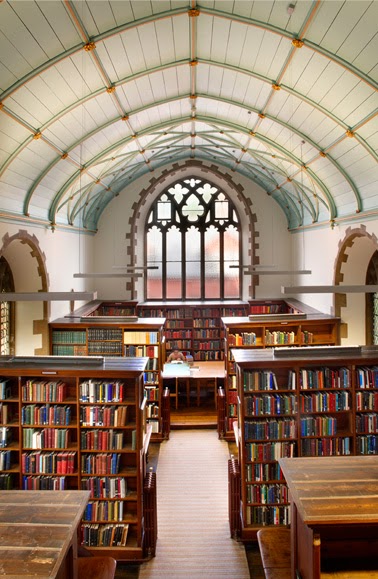 |
| Junior Library, Oriel College (formerly the chapel of St Mary's Hall) |
Some clues and considerations regarding the person twice-named B. L.:
- Englishman, young and good-looking ("fair")
- writes poetry . . . regular poet, or author of only fugitive verses?
- associated with Matthew Arnold. "Faith's gathering night" captures theme and spirit of Arnold's poem Dover Beach, confrontation at night with receding Sea of Faith and now pointless contest between "ignorant armies." From his study of Melville's marginalia Walter E. Bezanson judged:
“It was Arnold’s despondencies, his acute sense of the modern plight, that attracted Melville most.” --“Melville's Reading of Arnold's Poetry.” PMLA 69 (1954): 391
- Pilgrim to Jerusalem as a young man (unless that part is invented?).
- Studied at St Mary Hall, Oxford and thus connected to Oriel College, home of
Oxford Movement. - Complexly disaffected as verses and marginalia reveal; critical of Anglican rites and revolutionary politics. Hence convert or prospective convert to Catholicism, like John Henry Newman. Blessed John Henry Newman. BL, Bl. for Blessed?
- If not based on any one individual, why these particular initials, "B. L."? Echo of Bartleby? Billy? Bulwer-Lytton?
He read: obscurely thus it ran :—
'For me who never loved the stride,'What strain is this ?—But, here, in blur, —
Triumph and taunt that shame the winning side—
Toward Him over whom, in expectation's glow,
Elate the advance of rabble-banners gleam—
Turned from a world that dare renounce Him so,
My unweaned thoughts in steadfast trade-wind stream,
If Atheists and Vitriolists of doom
Faith's gathering night with rockets red illume—
So much the more in pathos I adore
The low lamps nickering in Syria's Tomb.'—
"After return from Sepulchre:
B. L." '—On the ensuing day
He plied the host with question free:
Who answered him, 'A pilgrim—nay,
How to remember! English, though—
A fair young Englishman. But stay ':
And after absence brief he slow
With volumes came in hand: 'These, look—
He left behind by chance.'—One book,
With portrait of a mitred man,
Treated of High Church Anglican,
Confession, fast, saint-day—deplored
That rubric old was not restored.
But under Finis there was writ
A comment that made grief of it.
The second work hath other cheer—
Started from Strauss, disdained Renan—
By striding paces up to Pan;
Nor rested, but the goat-god here
Capped with the red cap in the twist
Of Proudhon and the Communist.
But random jottings in the marge
Disclosed some reader of the text
Whose fervid comments did discharge
More dole than e'en dissent. Annexed,
In either book was penciled small:
"B.L.: Oxford: St. Mary's Hall."
Such proved these volumes—such, as scanned
By Clarel, wishful to command
Some hint that might supply a clew
Better enabling to construe
The lines their owner left on wall. --Clarel, Hendricks House ed.

Newman was only made Blessed by Benedict XVI in 2010, so that's an impossible connexion. Besides, only the first book is about the Oxford Movement. B.L. then goes on to read the second, something atheistic/vitriolic/revolutionary. So these are two influences that nevertheless leave him unsatisfied. Then, at the tomb on pilgrimage, he has an insight that he is more attracted to quiet reverence than polemics.
ReplyDeleteNo idea whether B.L. stands for anything specific, though--I just wanted to comment to say that the "blessed" connexion is anachronistic, and anyway B.L. doesn't identify with the Oxford movement any more than he does with Marxism--they were just two influences on him.
Way belated thanks. Guess I was free associating and got hung up in the B's. What about Arnold's friend Arthur Hugh Clough?
Delete